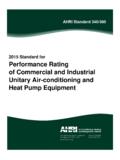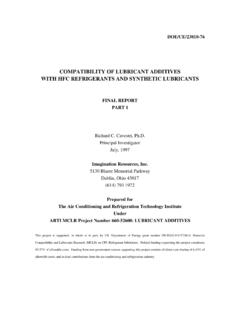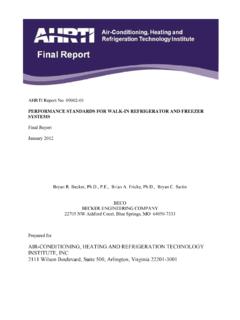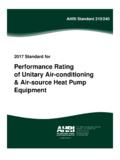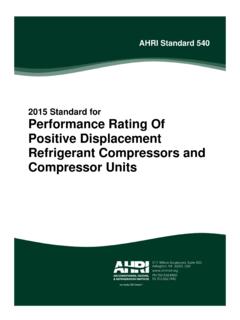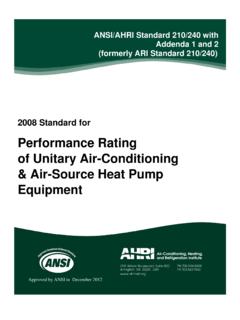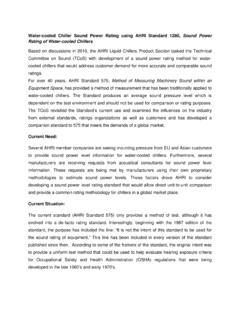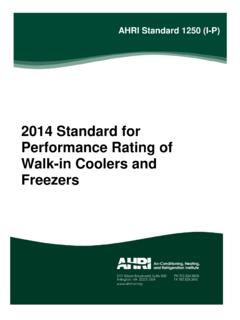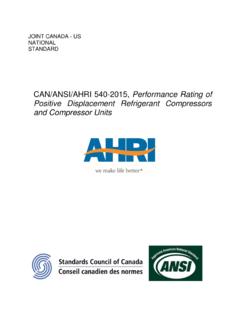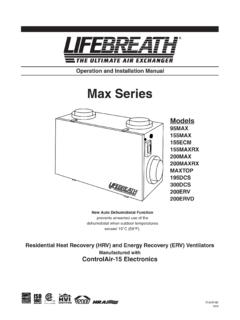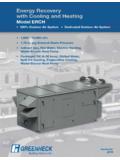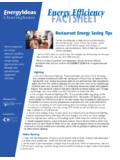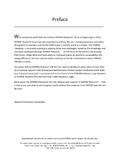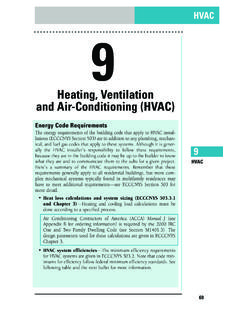Transcription of 2013 Standard for Performance Rating of Air- to …
1 AHRI Standard 1060 (I-P) 2013 Standard for Performance Rating of Air-to-Air Exchangers for energy recovery Ventilation Equipment Price $ (M) $ (NM) Copyright 2013 , by Air-Conditioning, Heating, and Refrigeration Institute Printed in Registered United States Patent and Trademark Office IMPORTANT SAFETY DISCLAIMER AHRI does not set safety standards and does not certify or guarantee the safety of any products, components or systems designed, tested, rated, installed or operated in accordance with this Standard /guideline. It is strongly recommended that products be designed, constructed, assembled, installed and operated in accordance with nationally recognized safety standards and code requirements appropriate for products covered by this Standard /guideline.
2 AHRI uses its best efforts to develop standards /guidelines employing state-of-the-art and accepted industry practices. AHRI does not certify or guarantee that any tests conducted under its standards /guidelines will be non-hazardous or free from risk. AHRI CERTIFICATION PROGRAM PROVISIONS Scope of the Certification Program The certification program includes Air-to-Air Heat Exchangers for use in Air-to-Air energy recovery Ventilation Equipment, rated at or above 50 scfm but below or equal to 5,000 scfm at AHRI Standard Rating Conditions. In addition, Air-to-Air Heat Exchangers for use in Air-to-Air energy recovery Ventilation Equipment rated above 5,000 scfm are included if the participant s basic model group(s) for those models include at least one model rated at or above 50 scfm but below or equal to 5,000 scfm.
3 This certification program does not include heat exchangers joined by circulated heat transfer medium (run-around loop). Certified ratings The following certification program ratings are verified by test: 1. Sensible Effectiveness at 100% Summer, 75% Summer, 100% Winter, and 75% Winter 2. Latent Effectiveness at 100% Summer, 75% Summer, 100% Winter, and 75% Winter 3. Pressure Drop at 100% CFM lab ambient conditions 4. Exhaust Air Transfer Ratio (EATR) at three pressure differentials, in H2O and two more within the scope of the program 5. Outdoor Air Correction Factor (OACF) at three pressure differentials, in H2O and two more within the scope of the program Note: This Standard supersedes AHRI Standard 1060-2011. For SI ratings , see AHRI Standard 1061 (SI)- 2013 .
4 TABLE OF CONTENTS SECTION PAGE Section 1. Purpose .. 1 Section 2. Scope .. 1 Section 3. 1 Section 4. Test Requirements .. 3 Section 5. Rating Requirements .. 5 Section 6. Minimum Data Requirements for Published ratings .. 6 Section 7. Marking and Nameplate Data .. 7 Section 8. Conformance Conditions .. 7 TABLES Table 1. Standard Rating Conditions .. 4 Table 2. Multiples for Rated 6 FIGURES Figure 1. Scheme of Airflows for Exchangers .. 2 APPENDICES Appendix A. References - Normative .. 8 Appendix B. References - 8 Appendix C. Calculation of Effectiveness - Normative .. 9 AHRI Standard 1060 (I-P)- 2013 1 Performance Rating OF AIR-TO-AIR HEAT EXCHANGERS FOR energy recovery VENTILATION EQUIPMENT Section 1.
5 Purpose Purpose. The purpose of this Standard is to establish for Air-to-Air Heat Exchangers intended for use in Air-to-Air energy recovery Ventilation Equipment: definitions; test requirements; Rating requirements; minimum data requirements for Published ratings ; marking and nameplate data; and conformance conditions. Intent. This Standard is intended for the guidance of the industry, including manufacturers, designers, installers, contractors and users. Review and Amendment. This Standard is subject to review and amendment as technology advances. Section 2. Scope Scope. This Standard applies to factory-made Air-to-Air Heat Exchangers for use in Air-to-Air energy recovery Ventilation Equipment as defined in Section 3.
6 Exclusions. This Standard does not apply to the Rating and testing of heat exchangers joined by circulated heat transfer medium (run-around loop). A run-around loop employs liquid-containing coils connected in a closed loop and placed in each of two or more airstreams. Section 3. Definitions All terms in this document will follow the Standard industry definitions in the ASHRAE Wikipedia website ( ) unless otherwise defined in this section. Air-to-Air energy recovery Ventilation Equipment (AAERVE). energy recovery components and packaged energy recovery ventilation units which employ Air-to-Air Heat Exchangers to recover energy from exhaust air for the purpose of pre-conditioning outdoor air prior to supplying the conditioned air to the space, either directly or as part of an air-conditioning (to include air heating, air cooling, air circulating, air cleaning, humidifying and dehumidifying) system.
7 Air-to-Air Heat/ energy Exchanger (hereinafter Exchanger ). A device that transfers heat/ energy from an exhaust airstream to a separated supply airstream. Air-to-Air Heat Exchangers are also referred to as energy recovery components. Heat Pipe Heat Exchanger. A device employing tubes charged with a fluid for the purpose of transferring sensible energy from one airstream to another. Heat transfer takes place through the vaporization of the fluid exposed to the warmer airstream and condensation of the fluid in the cooler airstream. Plate Heat Exchanger. A device for the purpose of transferring energy (sensible or total) from one airstream to another with no moving parts. This Exchanger may incorporate parallel, cross or counter flow construction or a combination of these to achieve the energy transfer.
8 Rotary Heat Exchanger. A device incorporating a rotating cylinder or wheel for the purpose of transferring energy (sensible or total) from one airstream to the other. It incorporates heat transfer material, a drive mechanism, a casing or frame, and includes any seals which are provided to retard the bypassing and leakage of air from one airstream to the other. Airflow. Entering Supply Airflow (OA). The supply airstream (outdoor air) before passing through the Exchanger, also AHRI Standard 1060 (I-P) 2013_____ 2 referred to as outdoor air, indicated in Figure 1 as Station 1. Sometimes referred to as the outdoor Airflow.
9 Leaving Supply Airflow (SA). The supply airstream (outdoor air) after passing through the Exchanger, indicated in Figure 1 as Station 2. Sometimes referred to as the supply Airflow. Entering Exhaust Airflow (RA). The exhaust airstream (indoor air) before passing through the Exchanger, indicated in Figure 1 as Station 3. Sometimes referred to as the return Airflow. Leaving Exhaust Airflow (EA). The exhaust airstream (indoor air) after passing through the Exchanger, indicated in Figure 1 as Station 4. Sometimes referred to as the exhaust Airflow. Figure 1 Scheme of Airflows for Exchangers Capacity Rate. The quantity of energy an airstream at a specific mass flow rate is able to absorb or release per unit time per unit change in temperature, humidity content, or enthalpy content.
10 Effectiveness. A ratio of the actual energy transfer (sensible, latent, or total) to the product of the minimum energy capacity rate and the maximum difference in temperature, humidity ratio, or enthalpy. The equation for determining Effectiveness is Equation C1 in Appendix C. Effectiveness is not adjusted to account for that portion of the psychrometric change in the Leaving Supply Airflow that is the result of leakage of Entering Exhaust Airflow rather than exchange of heat or moisture between the airstreams. Sensible Effectiveness. The Effectiveness determined in Section using only measured dry bulb temperature differences, specific heat capacities and mass airflow rates. Latent Effectiveness.
